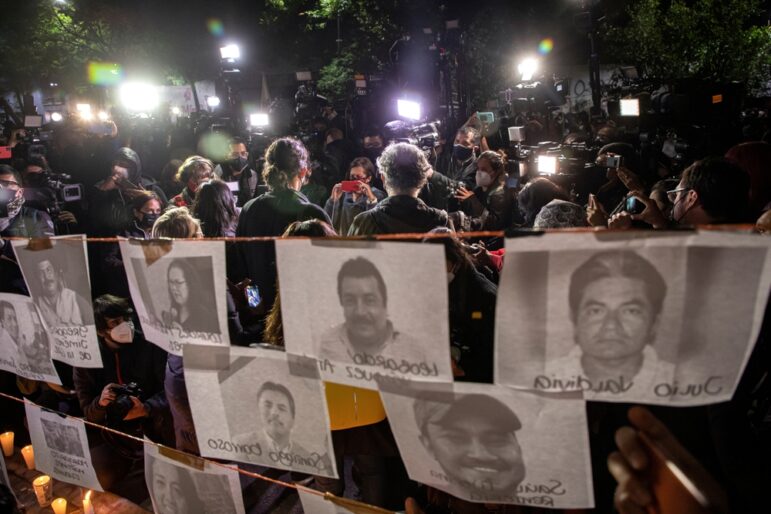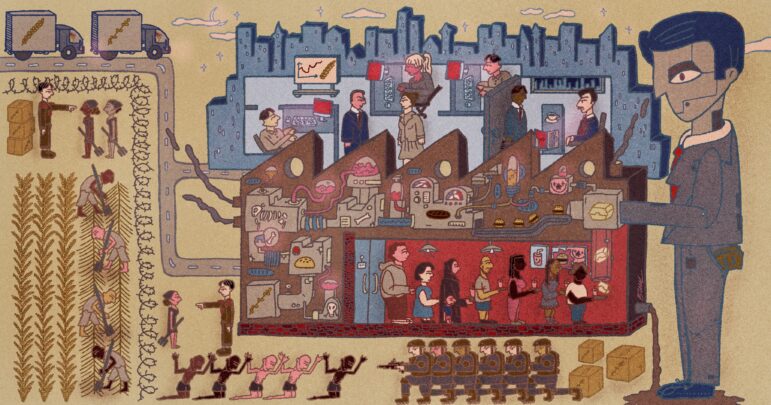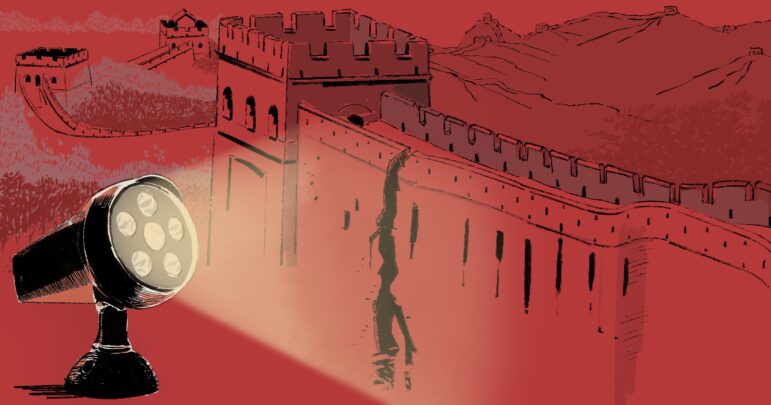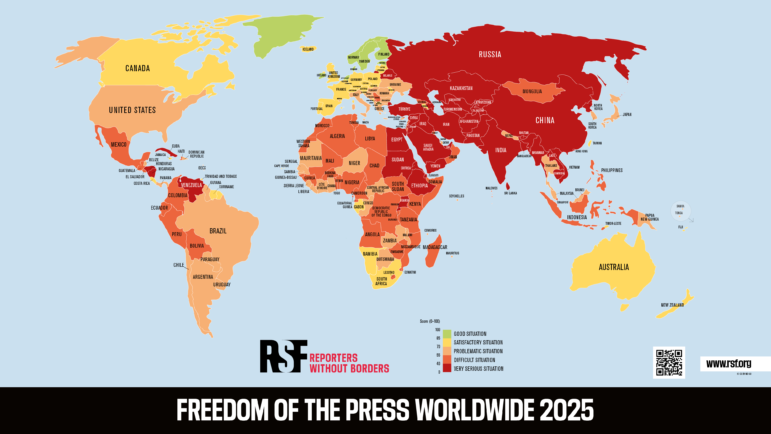

Journalists holding a demonstration in front of the Secretariat of the Interior in Mexico City in 2022, to protest the killing of media workers, some of whom are memorialized on the signs. Image: Shutterstock, Julio Ortega
How State Agents Target Journalists the Government Claims to Protect: Stark Warnings from Mexico and Honduras
Editor’s Note: This is an excerpt of a longer article that was originally published at The Conversation. It is republished here under a Creative Commons license.
Humberto Padgett was reporting on the effects of drought in Cuitzeo, a rural area of central Mexico, when his car was intercepted by armed men on September 13, 2024. They threatened him and stole the car, his identity papers, and work equipment, including two bulletproof jackets.
Padgett, a Mexican investigative journalist and author, was reporting on Mexico’s growing environmental worries for national talk radio station Radio Fórmula. It proved to be his last assignment for the station. Two days later, he tweeted:
Today I’m leaving journalism indefinitely. The losses I’ve suffered, the harassment and threats my family and I have endured, and the neglect I’ve faced have forced me to give up after 26 years of work. Thank you and good luck.
Padgett made this decision despite the fact that he, like many other journalists in Mexico, has been enrolled in a government protection scheme for years — the Protection Mechanism for Journalists and Human Rights Defenders, set up in 2012. Several other Latin American countries have similar protection programs, including Honduras since 2015.
These programs offer journalists measures such as panic buttons and emergency phone alerts, police or private security patrols, and security cameras and alarm systems for their homes and offices. Some are provided with bodyguards — at times, Padgett has received 24-hour protection.
In Honduras, reporter Wendy Funes, founder of the online news site RI, was given a police bodyguard after being threatened while covering an extortion trial that linked the Mara Salvatrucha (MS-13), an international criminal gang, with the Honduran government of former President Juan Orlando Hernández, who is now serving a 45-year prison sentence in the US for drug trafficking and arms offenses.
Yet even once journalists are enrolled in these government protection schemes, the attacks and threats continue. Shockingly, many come from state employees who, in both Mexico and Honduras, are thought to be responsible for almost half of all attacks on journalists. But the prospect of punishment is remote: at least 90% of attacks on journalists go unprosecuted and unpunished, meaning there is little deterrent for committing these crimes.
Both Mexico and Honduras currently have left-wing governments that have promised to protect journalists, following a long history of crimes against media professionals in both countries. Yet the risk to journalists posed by the state has worsened in recent years amid increasing use of spyware, online smear campaigns, and rising levels of anti-media rhetoric.
Journalists perceived as critical of the leadership are regularly accused of being corrupt, in the pay of foreign governments, and putting out fake news. Donald Trump’s vocal criticism of mainstream media since returning to power in the US is likely to have encouraged this anti-media hostility in Mexico and Honduras, as it has elsewhere in the world.
Many journalists there have developed strategies for self-protection, including setting up NGOs that support colleagues at risk. But while they are doing journalism in ways that make reporting safer, their work has been further threatened by the abrupt suspension of USAID and other US grants, which is heightening the dangers faced by journalists in Latin America and around the world.
Threats from the State
When I tell people about my research into how journalists in Latin America deal with the relentless violence and impunity, their first question is usually: “Oh, you mean drug cartels?” And indeed, both Padgett and Funes have received death threats for their investigations into cartels and other organized crime groups.
Padgett was once sent an unsolicited photo of a dismembered body in a morgue. He was beaten and kicked in the head by armed men who threatened to kill him and his family while he was reporting on drug dealing on a university campus in Mexico City in 2017. He wears a bullet-proof jacket — or did until it was stolen — and keeps his home address a closely guarded secret.
But cartels and gangs are only part of the story when it comes to anti-press violence and impunity in these countries. In many ways, the bigger story is the threat from the state. This has been a constant despite changes in government, whether right or left wing.
My research project and resulting book were inspired by my work providing advocacy, practical, and moral support for journalists at risk in Latin America for an international NGO between 2007 and 2016. The extent of the risk posed by state agents — acting alone or in cahoots with organized crime groups — is clear from the many journalists I’ve spoken to in both Mexico and Honduras.
I first interviewed these reporters, and the organizations that assist them, in 2018, then again in 2022-23 (89 interviews in total), to chart how journalists struggle for protection and justice from the state in the face of growing challenges at both the domestic and international level.
For both Padgett and Funes, the intimidation, threats, and attacks from organized crime groups often followed them reporting on state agents and their alleged links with such groups. Organized crime groups have deeply infiltrated the fabric of society in many parts of Mexico and Honduras — including politics, state institutions, justice, and law enforcement, particularly at a local level.
In Padgett’s case, the suspected cartel threats came after he published a book and investigation into links between state governments and drug cartels, including drug money for political campaigns in Tamaulipas and a surge in cartel-related violence in Morelos under a certain local administration.
Padgett had first joined the federal protection mechanism after he was attacked by police when filming a raid in central Mexico City in 2016. The police confiscated his phone and arrested him.
He was later assigned an around-the-clock bodyguard after the Mexico City prosecutor’s office made available his contact details and his risk assessment and protection plan — produced by the state program that was supposed to safeguard him — for inclusion in the court file on the 2017 attack on him at the university. This meant the criminals behind the attack had full access to this information.
Being part of this protection program did not stop the threats by state employees. In April 2024, while trying to report from the scene of the murder of a local mayoral candidate in Guanajuato state, Padgett was punched in the face by a police officer from the state prosecutor’s office, who also smashed his glasses and deleted his photos.
Years earlier, he had been subjected to a protracted legal battle by former Mexico state governor and presidential candidate Eruviel Ávila Villegas, who sued Padgett for “moral damages” to the tune of more than US$500,000. His offense? A 2017 profile that mentioned that the politician had attended parties where a bishop had sexually abused male minors.
Padgett eventually won the case — but only on appeal, thanks to a pro bono legal team, after 18 months of stress and traveling to attend the hearings. This is a part of a growing trend of “strategic lawsuits against public participation” (SLAPPs) in Mexico and Latin America, aimed at silencing journalists and other critical voices.
As Padgett put it: “[Even] once we manage to win, there are no consequences for the politicians who call us to a trial without merit — no consequences at all. Eruviel Ávila is still a senator for the PRI [Institutional Revolutionary Party]” — and he was not even liable for costs.
Mexico’s federal government and army have also carried out illegal surveillance of the mobile phones of journalists and human rights defenders investigating federal government corruption and serious human rights violations on multiple occasions, including by using Pegasus spyware.
In Honduras, Funes is no stranger to state harassment either. In 2011, she was among around 100 journalists, many of them women, who were teargassed and beaten with truncheons by officers of the presidential guard and the national police during a peaceful protest against journalist murders.
In recent years, according to Funes, she and her team at RI have been targeted by cyberattacks and orchestrated smear campaigns on social media that have sought to tar them as being corrupt or associated with criminal gangs. She suspects the army is behind some of these attacks since RI has written in favor of demilitarizing the police. Several RI team members have been stopped at army checkpoints; when they have denounced this on TikTok or Facebook, they have been flooded by negative comments.
RI has also been attacked by government supporters unhappy with its critical coverage of the Honduras President Xiomara Castro’s left-wing administration. In August 2024, Funes was threatened with prosecution by the governor of Choluteca, southern Honduras, over RI’s investigation into alleged involvement by local government officials in migrant trafficking. And earlier in 2025, Funes and a human rights activist were subjected to misogynistic and sexist diatribes and threats by the head of customs for the same regional department, for demanding justice for a murdered environmental defender.
Almost half of all attacks on journalists in Mexico and Honduras are attributable to state agents, particularly at the local level. In Mexico, the NGO Article 19 has attributed 46% of all such assaults over the last decade to state agents including officials, civil servants, and the armed forces.
In Honduras, according to the Committee for Free Expression (C-Libre), 45% of attacks on journalists in the first quarter of 2024 were attributed to state agents, up from 41% in 2021. These include the national police, the Military Public Order Police, officials, and members of the government.
[…]
Journalism as the Solution
Fortunately, journalists like Padgett don’t give up easily. After an eight-month hiatus following the attack in Cuitzeo and its aftermath, he now feels ready to go back to reporting.
Although he succeeded in getting the shelved investigation into the 2017 attack on him and subsequent data leak reopened, the lack of any action since means he’s decided to draw a line under this labyrinthine process. He is now looking for “alternative means of justice to compensate for the impunity”.
As a part of the reparations, he has been promised a formal apology from the Mexico City Prosecutor’s Office (similar to the apology received by Cacho). Such a ceremony is not justice and may largely be symbolic, but Padgett feels it will allow him to move on and focus on journalism again — this time as a freelancer. He is keen to make the point that Mexico remains “an extraordinary place to be a reporter.”
Despite the lack of state protection and all the other challenges, journalists like Padgett and Funes are determined to keep going — investigating their countries’ ills, probing the root causes, transforming their profession. Their commitment offers a ray of hope for the emergence of a truly free and independent media in Mexico, Honduras and beyond.
 Tamsin Mitchell is a visiting researcher and former ESRC postdoctoral fellow at the Centre for Freedom of the Media (CFOM), Department of Journalism, University of Sheffield. She completed her PhD in Politics at the University of York’s Centre for Applied Human Rights in 2021, also funded by the ESRC. Since then, Mitchell has worked as an independent researcher and consultant, with clients including the Office of the United Nations Commissioner for Human Rights (OHCHR) and the European Parliament’s Subcommittee on Human Rights. She has many years’ prior experience of working in the international human rights and development sector, including managing programs of research and advocacy in Latin America and Africa for PEN International from 2007-2016, providing support to writers and journalists at risk.
Tamsin Mitchell is a visiting researcher and former ESRC postdoctoral fellow at the Centre for Freedom of the Media (CFOM), Department of Journalism, University of Sheffield. She completed her PhD in Politics at the University of York’s Centre for Applied Human Rights in 2021, also funded by the ESRC. Since then, Mitchell has worked as an independent researcher and consultant, with clients including the Office of the United Nations Commissioner for Human Rights (OHCHR) and the European Parliament’s Subcommittee on Human Rights. She has many years’ prior experience of working in the international human rights and development sector, including managing programs of research and advocacy in Latin America and Africa for PEN International from 2007-2016, providing support to writers and journalists at risk.









